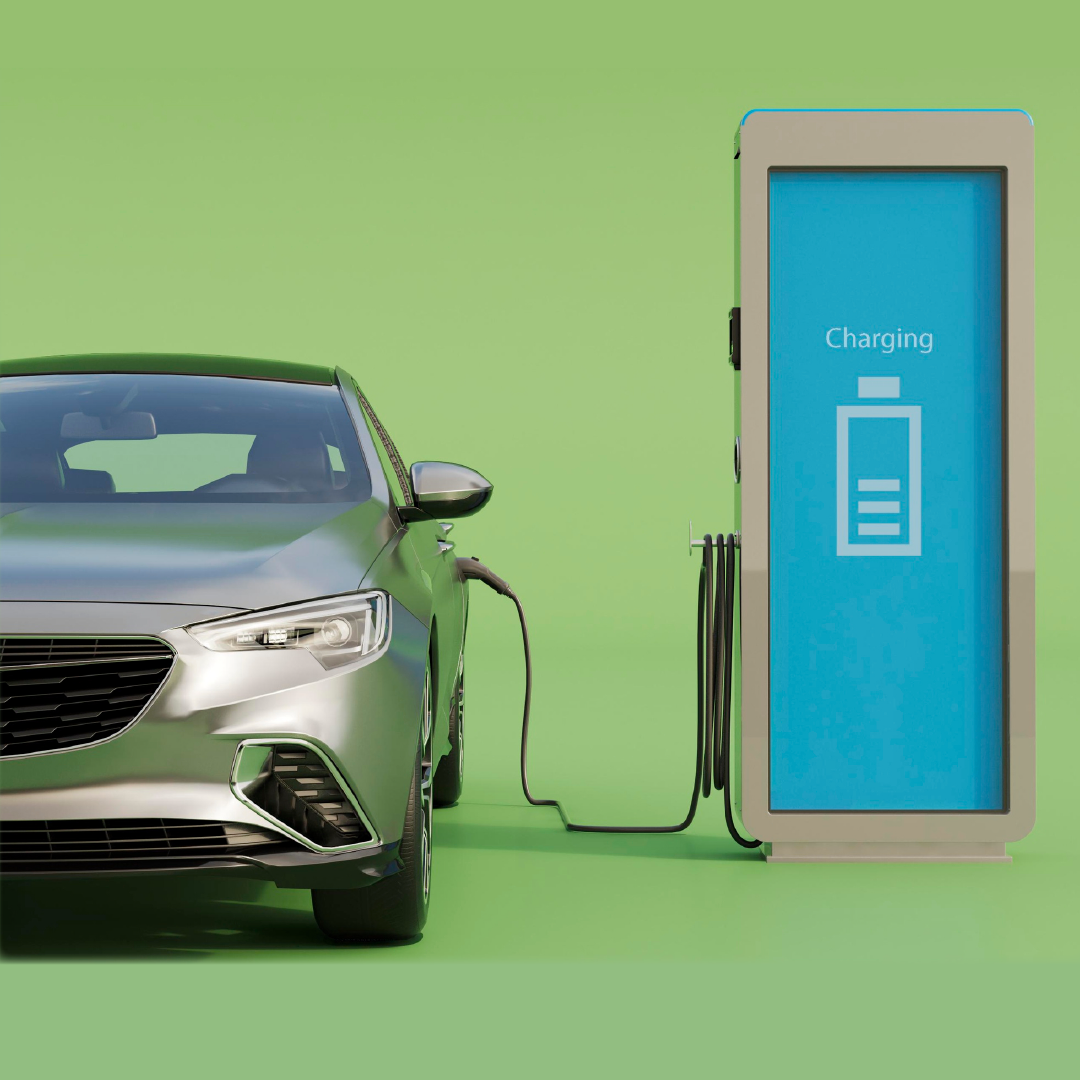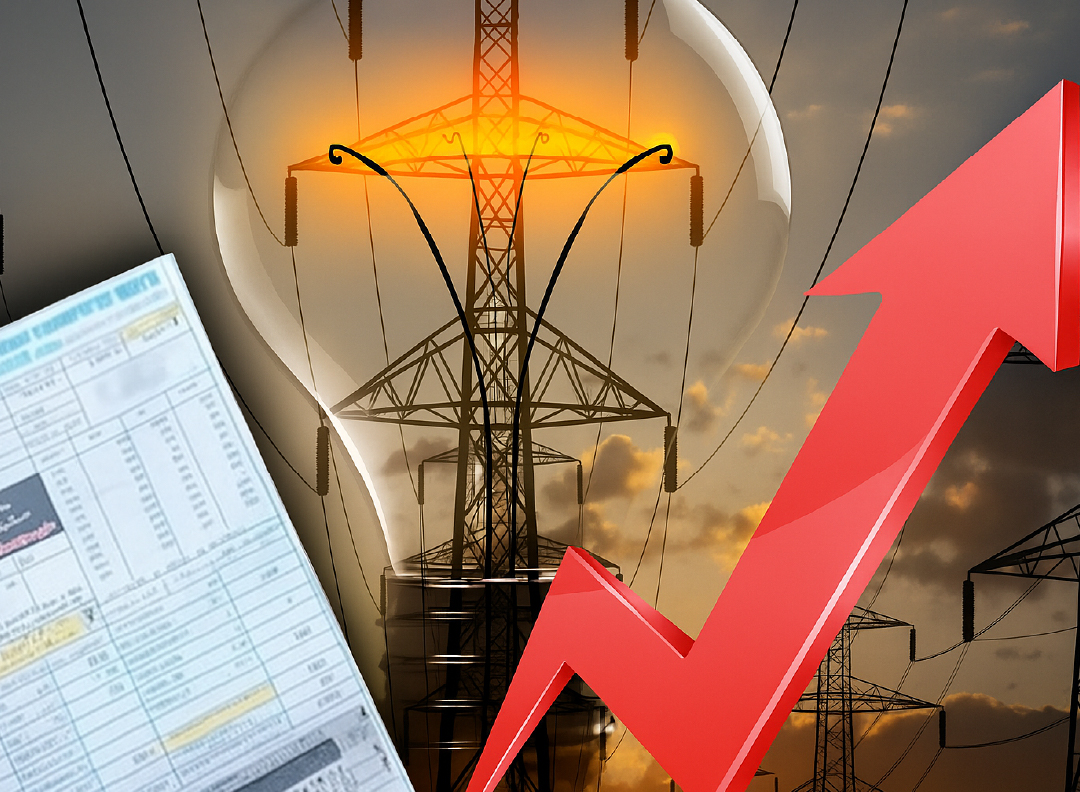Pakistan, like many countries around the world, is increasingly looking towards Electric Vehicles (EVs) as modern means of transport. They can help combat climate change by reducing dependence on fossil fuels. According to the Ministry of Climate Change, almost 43% of the air pollution comes from automobile tailpipes and EVs offer an eco-friendly alternative.
Several companies have expressed interest in bringing EVs to Pakistan. One of the new entrants, MG Motors, a Chinese automotive company with British heritage, recently announced plans to introduce electricity-powered vehicles in the country.
Another notable new entrant would be Hyundai, which is considering launching in Pakistan. These companies see potential in the Pakistani market, which has been heavily reliant on fossil fuels - accounting for 59 per cent of the total production.
Despite the investors’ interest, there are several issues that EV companies are expected to face, such as lack of supportive infrastructure, particularly charging stations. Without a robust charging network, potential EV buyers may be deterred from purchasing these vehicles due to concerns around range anxiety and practicality.
An important factor is the high cost at which EVs come, putting them a bit beyond the affordability bracket for an average Pakistani. While these ‘cleaner’ vehicles are generally cheaper to run than traditional vehicles, their initial purchase cost is a lot higher. In a country where the average income is relatively low – hovering around $1,5000 since 2016, high prices limit their adoption rate.
Though there is still a possibility that Pakistan will see EVs making significant inroads in the country, experts in the industry believe that Chinese companies, such as the global EV leader BYD, which recently surpassed the top US-based EV manufacturer Tesla in 2023 by producing the highest number of EVs - might help address the price issue. BYD is partnering with a local holding company, Mega Conglomerate, to enter the Pakistani market as early as this year.
Mashood Khan, an expert in the auto sector and former chairman of the Pakistan Association of Automotive Parts and Accessories Manufacturers (PAAPAM), welcomed the news of BYD coming to Pakistan, viewing it as a positive development against the current economic landscape. He emphasised BYD's potential to assist Pakistan in transitioning to electrified commute options and facilitate in rendering them rather affordable.
Khan, who operates a manufacturing company for automotive parts, underscored the role of companies like BYD in improving EV accessibility for the people. He is positive that BYD might localize its production processes for EVs, possibly boosting Pakistan's export potential in the mobility sector.
He pointed towards having a national direction that involves the government, industry, and academia to identify a specific area in the EV industry where Pakistan can excel.
Aamir Allawala, Director of Transsion Tecno Motors Pvt. Ltd, an electric bike company, stated that EVs are a futuristic technology, and every country must convert to EVs if they are to meet their goals on controlling carbon emissions.
“There are certain areas of improvement. Battery life has to be enhanced, and price range has to be lowered. While the initial purchase of an electric vehicle is costly, there are savings - as the charging cost is significantly less compared to the petrol expense”, Allahwala shares.
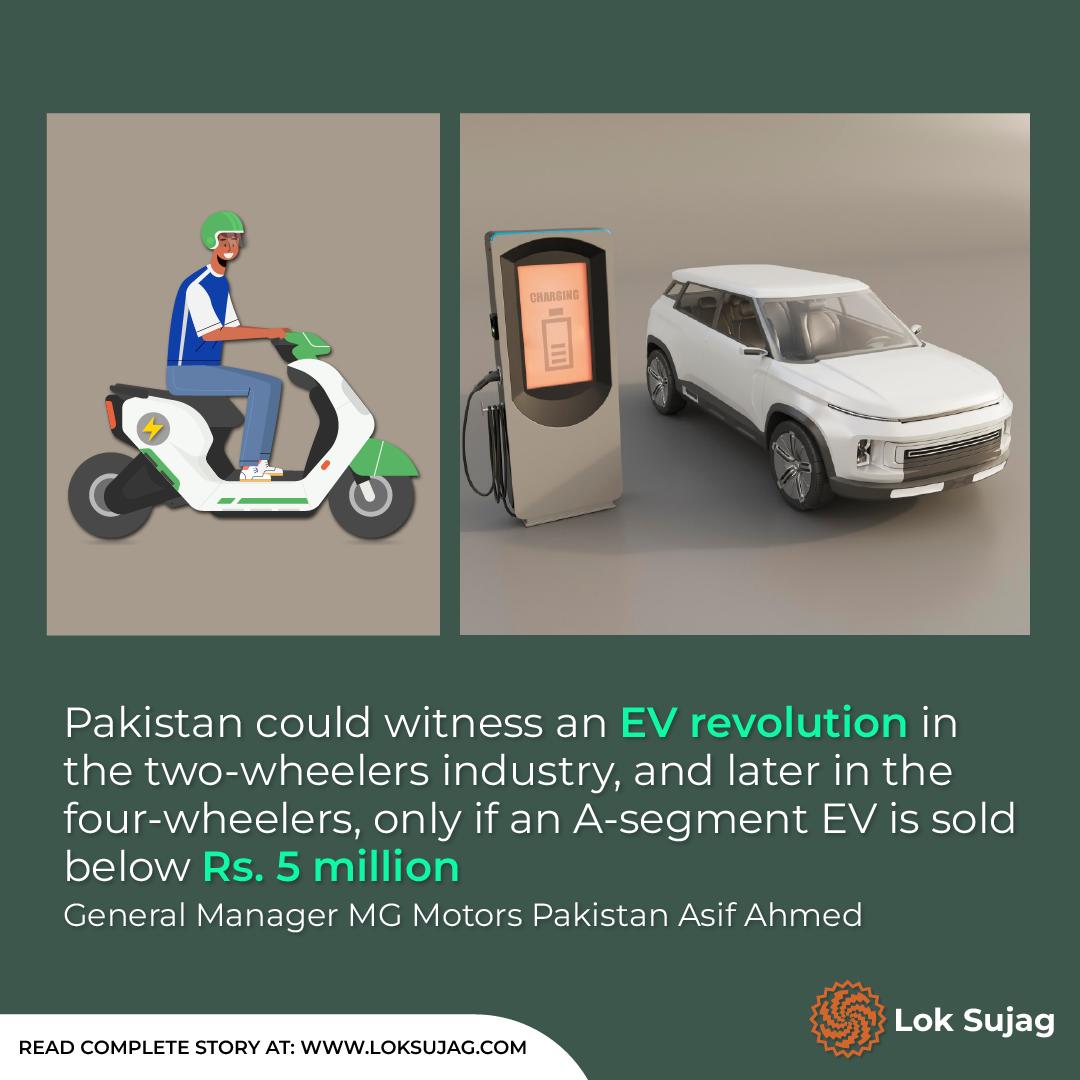
“Though efforts are underway in technology development, the range of e-bikes is currently limited, typically 80-100 kilometres, which must be increased. Charging infrastructure is also a challenge. For those living in bungalows, charging is not an issue, but for the large population living in apartments, charging e-bikes is anything but easy”.
Allawala added that the adoption of e-bikes is rapidly occurring in many countries, and for this to happen in Pakistan, government support is essential.
“Local manufacturing will help increase sales volume and will also help indigenize the entire process”, he expressed.
General Manager MG Motors Pakistan Asif Ahmed believes that there are some quarters which wouldn’t want Pakistan to switch to EVs, as purchasing and consuming oil for our transport sector benefits the supply chain —from import to shipment, unloading, and oil trucks zipping through different parts of the country.
Japanese companies dominate Pakistan’s auto industry, allowing them to influence policy in favour of hybrids. Ahmed argues that while hybrid cars may consume less fuel in cities, on highways, they perform similar to petrol cars. Ahmed points out the disparity in taxes, stating, “There is an 8.5% GST on hybrids whereas it is 18% on EVs.”
According to Ahmed, Pakistan could witness an EV revolution in the two-wheelers industry, and later in the four-wheelers, only if an A-segment EV is sold below Rs. 5 million.
He also mentions global challenges that EVs will face, including international policies restricting their fast-paced adoption, raw material restrictions—especially for lithium—and competition from different technologies such as hydrogen cell technology.
Despite these challenges, Ahmed believes that Pakistan can become a part of the larger supply chain, citing the country's ability to manufacture motors. He argues that while EV motors are technologically advanced, with investment and favourable policy intervention, Pakistan could produce certain parts for EVs that could be exported in large numbers.
MG Motors has introduced the EV MG4 CBU in Pakistan. Ahmed notes that CKD production could only begin when there is sufficient demand and a promising market locally.
Electric mobility: Hybrid vehicles bridging the gap
In Pakistan, Toyota is the market leader. It has been the first company to initiate manufacture of hybrid cars in Pakistan, introducing its hybrid 1800cc SUV Corolla Cross. Interesetingly, hybrid cars have shown 50 per cent enhanced fuel efficiency.
Globally, Toyota has pioneered hybrid vehicles with its Prius model, which combines an internal combustion engine with an electric motor, offering better fuel efficiency than a conventional car. But, the company appeared hesitant when it came to investing in fully electricity-run vehicles, citing concerns about battery technology and infrastructure.
Toyota has managed to get similar tax incentives for EVs from the government, and as Asif Ahmed mentioned this would facilitate the transition by having hybrids serve as an adequate intermediary option for the people, before we manage to phase out petrol-run vehicles from Pakistan. The company points to the missing EV infrastructure that leads to buyers wary of purchasing these new automobiles.
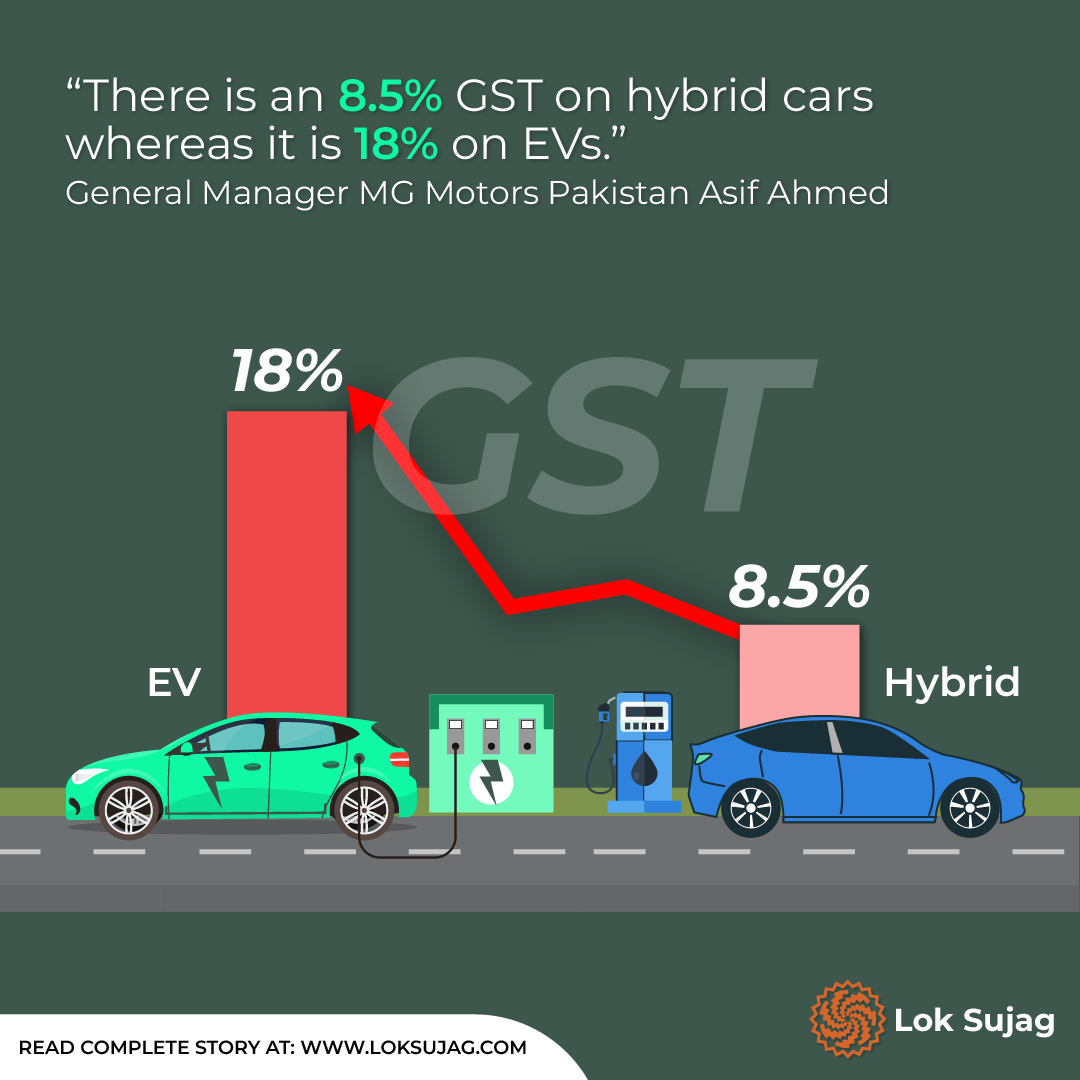
Toyota international has also been cautious while adopting EVs. One key concern is the limitations of current EV technology, particularly in terms of range and charging infrastructure.
Hydrogen fuel-cell vehicles
Toyota has also expressed interest in hydrogen fuel cell technology as an alternative to EVs. Hydrogen fuel cells convert hydrogen gas into electricity, producing only water vapor as a byproduct. The company sees hydrogen as a cleaner and more versatile alternative to traditional fossil fuels, as hydrogen can be produced from various renewable sources.
Additionally, Toyota has highlighted some advantages of hydrogen fuel-cell vehicles over EVs. Hydrogen fuel cell vehicles can be refuelled quickly, similar to traditional vehicles, whereas EVs require longer charging times. Hydrogen fuel cell vehicles also have a longer distance range compared to most EVs, addressing one of the key consumer concerns.
However, there is a flip side to the hydrogen fuel cell technology, including the high cost of producing and storing hydrogen, as well as a very limited infrastructure for refuelling stations. These challenges have slowed the adoption of fuel-cell vehicles in comparison with EVs.
Toyota's cautious approach to electric vehicles is driven by concerns about current technology limitations and infrastructure challenges. The company sees hydrogen fuel-cell technology as a potential alternative to EVs, offering advantages such as quick refuelling duration and longer ranges. However, the future of hydrogen vehicles depends on overcoming the challenges associated with hydrogen production, storage, and infrastructure.
Two-wheelers well-poised for an EV transition
An initial EV rise in Pakistan is led by two-wheelers – the electric bikes. Last year, 32 companies applied to register with the Engineering Development Board (EDB) – most of which were for two-wheelers. Despite an international surge in electric four-wheelers, there has been little interest in the domain so far, mostly due to the constraints of price and infrastructure.
The market leader in the two-wheel segment in Pakistan, Atlas Honda, also unveiled its electric scooter ‘BENLEY e’ during a ‘soft’ launch in November last year. Sources close to the company revealed that it will be sold to bulk buyers such as delivery and logistics companies who can easily be given after-sales service. The company is testing the market for EVs with the soft launch. Experts say this initiative of the company shows its intention to enter the market for e-bikes.
Association of Pakistan Motorcycle Assemblers (APMA) Chairman Muhammad Sabir Shaikh shared that “there is an immense interest in EV bikes”, and quite often new motorcycle buyers would inquire about e-bikes to see if these would be affordable and practical.
Sheikh added that production of electric bikes has started and the number will only go up. He said users of motorcycles are the most price-sensitive group, and high fuel prices are putting immense pressure on this group. Therefore, electric bikes give them immense incentive as their fuel expense can be reduced to just a quarter of their normal expense.
What does the government have up its sleeves?
The government has also shown some support for EVs through various policies and initiatives. For example, the government has announced tax incentives for EV manufacturers and buyers, which could help reduce the cost of EVs and make them more affordable for consumers.
The government introduced the Electric Vehicle Policy in 2020 to encourage manufacture, import, and use of EVs in Pakistan. The policy aims to reduce carbon emissions, improve air quality, and promote the use of renewable energy sources in the transport sector.
Also Read
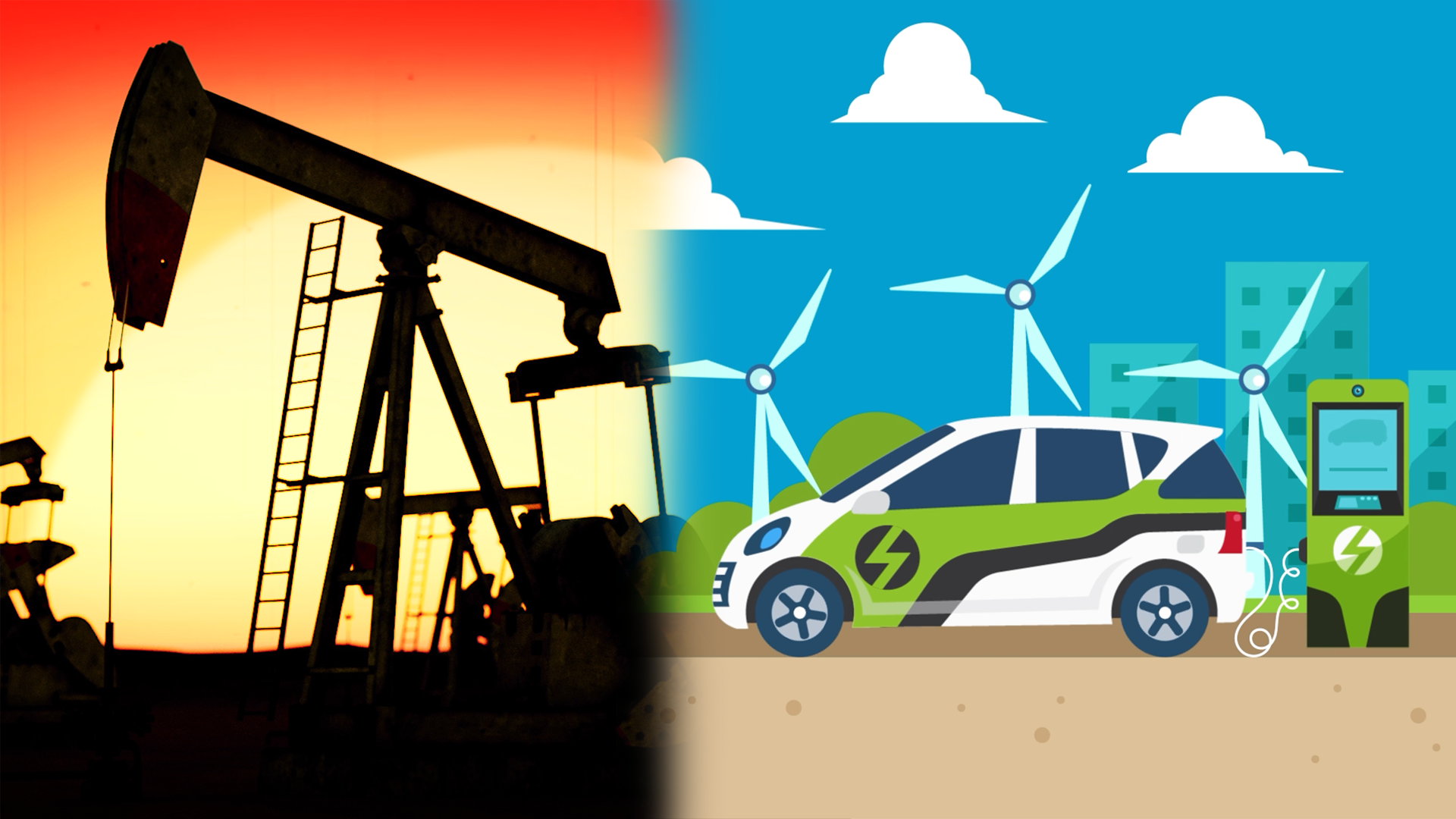
From Fossil Fuels to Batteries: The Electric Vehicle Era
The EV Policy offers a complete exemption of customs duty on the import of electric buses, trucks, and passenger cars, as well as a reduced rate of duty on the import of electric two-wheelers and three-wheelers.
Electric vehicles are exempted from Federal Excise Duty, making them more affordable for consumers. As per the policy EVs are exempted from paying road tax for a period of five years, further reducing the running cost.
The government has announced plans to develop a network of EV charging stations across the country to support the growing number of EVs on the road.
The policy encourages local manufacturing of EVs and their components by offering incentives such as reduced customs duty on raw materials and components used in EV manufacturing. To promote local manufacturing of EV batteries, incentives such as reduced customs duty on raw materials and components used in battery production have been offered.
In Pakistan, government policies can also be a double-edged sword. While incentives can encourage EV adoption, inconsistent strategies and a lack of long-term planning could hamper the growth potential of EVs in the automobile sector.
It is crucial for the government to create a stable and supportive regulatory environment to attract investment and encourage the development of the EV industry in Pakistan.
Published on 26 Apr 2024
